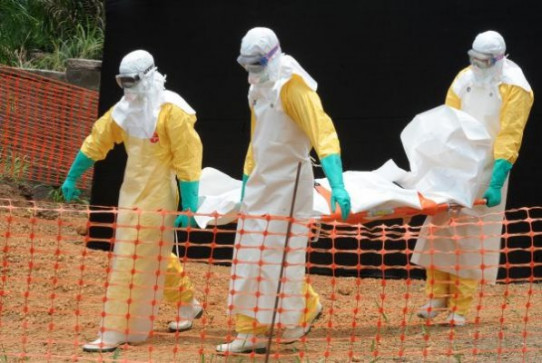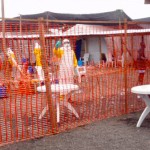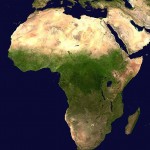
After Ebola
Though the worst of the Ebola epidemic may indeed be behind West Africa, its aftermath, especially its heavy toll on the stability and economic viability of significant parts of those countries hardest hit by the virus, is likely just beginning. The impact of the virus across Liberia, Sierra Leone, and Guinea has thrown entire civil and political ecosystems out of balance, ecosystems only recently recovering from long periods of instability and violence. What’s next for these nations will rely heavily on their capacity to preempt any future political and civil unrest once the world’s attention, and resources, turns elsewhere. With reports that the ongoing epidemic could lead to a widespread hunger crisis or another, equally catastrophic future, the time for the world’s leaders is now to be asking: what happens after Ebola?

A U.S. military built Ebola treatment center in Liberia.
In those countries hardest hit by Ebola—countries where there are already well documented imbalances, the virus will certainly have catastrophic second and third order effects long after the crisis ends. There are increased fears that any attendant social disruption could lead to unrest in countries where a large proportion of the population are already struggling. And, according to the International Crisis Group, the health crisis risks becoming a political one.
Yet, these types of shocks are a natural part of the biological order. And there is much that can be learned from nature’s attempts to recover from them. With decades of research on this topic, biologists and environmental researchers have found that even small changes in the equilibrium of an ecological system will be corrected by some opposing feedback in order to return it back to its original point of balance. This theory also finds support in the study of the natural balance of modern societies and nation states that derive their health and security from a sociological and geo-political homeostasis. Even small changes in the size of a particular population, for example, can have a significant impact on the social, political, and economic ecologies of a community or country.
As in nature, shocks of this magnitude to civil ecosystems often leave previously healthy systems vulnerable to non-native invaders. These “weeds” are able to infiltrate, and eventually take over a once healthy ecosystem, in some cases to the peril of indigenous species.
In the case of West Africa, these proverbial weeds can take many forms—from foreign terrorist organizations who see opportunity to thrive in a failed region or state; insurgent groups frustrated by the actions and responses of existing governments; or, even the migration of foreign tribes or populations from outside the community or country—all equally, significant threats to the future safety and stability of whole regions, and by extension, to global development and security.
And women and children will bear the heaviest burden. In these West African societies, for example, women have borne the greatest brunt of the Ebola epidemic, they will also be key actors in any return to the region’s stability. If security actors and policy makers do not think critically about how to engage them as one aspect of a robust security strategy, they will certainly be hampered in their efforts to return some level of resilience to those communities most impacted in Liberia, Guinea and Sierra Leone.
No matter how quickly the world’s health agencies find success in their efforts to bring an end to the epidemic, there will be entire regions of all three countries decimated by the disease. The mobilization of women—who are often the bulwarks of communities and the first line of defense against instability—to respond to the non-health effects of Ebola is crucial to the preservation of stability. This can include the re-opening of “schools” in homes and makeshift tents; caring for orphans and elderly who are unable to fend for themselves; populating, and even leading, religious services and worship in areas where religious leadership has been affected; or, building supportive relationships across sectarian lines. And in response to fears, misinformation, and conspiracy theories, women are vital allies in ensuring the delivery of factual information. A return to “normalcy” is critical as a pre-emptive measure against the encroachment of insurgents or terrorist groups looking to take advantage of civil instabilities and human mistrust, and women can certainly play a strong role in challenging this reality.
 In light of last month’s UN Security Council resolution declaring Ebola a potential threat to peace and security in the region, the world’s leaders must begin to think strategically, and long term, about the potential challenges to the future stability of West Africa that will likely result from Ebola’s vice-like grip on the region. While responding to the current health and humanitarian aspects of the crisis, they must simultaneously think about what’s next, and pre-emptively about how to counter those potential threats that endanger the civil equilibrium and arduously-won stability of a war-scarred region least able to recover from the crippling effects of the epidemic.
In light of last month’s UN Security Council resolution declaring Ebola a potential threat to peace and security in the region, the world’s leaders must begin to think strategically, and long term, about the potential challenges to the future stability of West Africa that will likely result from Ebola’s vice-like grip on the region. While responding to the current health and humanitarian aspects of the crisis, they must simultaneously think about what’s next, and pre-emptively about how to counter those potential threats that endanger the civil equilibrium and arduously-won stability of a war-scarred region least able to recover from the crippling effects of the epidemic.
The shock of the Ebola virus to an already delicate social, political and economic ecosystem will reverberate in significant ways throughout Africa with the potential to produce both a civil and political vacuum. The true benchmark of the world’s response to the crisis is how that vacuum will be filled and what resources will be put in place to ensure that the ecosystems of Liberia, Sierra Leone and Guinea remain in a state somewhat reflective of, if not better than, their former selves.
More from ASP:
Africa – Promoting Investment and Extending America’s Security
Critical Issues Facing Africa: Terrorism, War, and Political Violence





